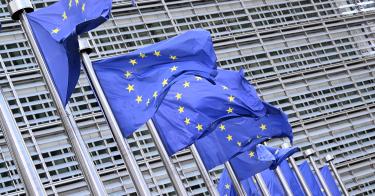As Europe grapples with the fallout of its net zero crusade—crippling energy prices, deindustrialization, and strategic vulnerability—America is charting a different course. Under Donald Trump, America is entering a golden age of energy dominance. This strategy offers not only economic resilience but also acts as a powerful counterweight to the regulatory overreach emanating from Brussels—and increasingly, Westminster.
Yet this progress is under threat. A web of EU regulations now seeks to impose net zero compliance on firms with revenues exceeding a certain amount, requiring them to restructure operations and disclose emissions not only from their own activities but also from contractors and subcontractors. This won’t just affect European companies, but is highly likely to impact American businesses with European operations, too. America must resist this interference.
Energy should be a unifying issue. No country should want their electricity grid to resemble South Africa’s, or their industrial base to mirror Germany’s stagnation. Misguided policies have left Europe dangerously exposed. Germany’s reliance on Russian gas, followed by a panicked return to coal, is one cautionary tale. Spain’s blackout earlier this year—blamed by some on an over-reliance on solar—is another.
Speaking in Brussels on Sept 11, meanwhile, U.S. energy secretary Chris Wright lamented: “The UK example is, to me, heartbreaking—to see the birthplace of the industrial revolution export almost all of its energy-intensive industry, its steelmaking, its petrochemical making, its aluminium fabrication.”
>>> The Long Game on Trump’s Energy Dominance Plans
The United States almost followed suit. The Biden administration’s attempt to align U.S. energy policy with European orthodoxy—prioritizing renewables and restricting fossil fuels—was economically reckless and geopolitically naïve. It risked entangling America in the same energy poverty now afflicting Europe.
By the end of Joe Biden’s term, the North American Electric Reliability Corporation warned of widespread blackout risks due to a weakened grid. It had been undermined by the premature retirement of fossil-fuel power plants, and wind and solar investments lacking sufficient fossil-fuel backup.
President Trump’s reversal was swift and decisive. He declared a national energy emergency, lifted restrictions on domestic production, scrapped electric vehicle mandates, allowed coal-fired power plants to remain open, and committed to permit more natural gas exports. These measures have helped restore America’s energy leverage and positioned it as a reliable supplier to allies and energy-starved regions.
But Europe is attempting to drag America back into the regulatory morass of net zero compliance. The chief culprits are two EU directives that seek to give Brussels extra-territorial power over U.S. firms.
First is the Corporate Sustainability Reporting Directive, which mandates extensive environmental, social, and governance disclosures for a wide range of companies, including non-EU firms with significant European operations.
The Corporate Sustainability Due Diligence Directive goes further, requiring companies to overhaul their business models to address so-called “environmental impacts”. It demands that firms adopt transition plans for climate change mitigation, aligning their strategies with the Paris Agreement’s target of reducing greenhouse gases to limit temperature increases to 1.5°C. Non-compliance carries legal liabilities. These sweeping requirements will apply to global operations of major companies—including those based in America and the UK—starting in 2029.
>>> America Is Scrapping Green Restrictions on Cars. It’ll Leave Europe in the Dust
And it’s not just the EU. A public consultation is currently under way in the UK on how to implement Labour’s manifesto pledge to require corporate transition plans to align with the Paris Agreement. Comments are due to the misnamed Department for Energy Security and Net Zero by Sept 17 (email them to [email protected]).
Net zero, as currently pursued, maximizes misery. It is energy colonialism in a modern guise—hollowing out Europe’s industrial base, driving up costs, and handing strategic advantage to China. German industrial output fell 4.5 per cent in 2024, marking the fourth consecutive year of decline. Subsidized Chinese EVs are likely to be contributing to lay-offs across Europe’s auto sector.
These EU regulations, if fully implemented, could well end up forcing American companies to purchase more wind turbines and solar panels, many of which are made in China, with its 1,200 coal-fired power plants. If America became dependent on Chinese green energy, and China decided to cut off critical supplies, America would be in trouble. No solar panels or wind turbines, no fossil fuels.
Europe apparently wants America to share in the pain of its green crusade. Just as high minimum-wage states push for federal minimum wage hikes, Brussels seems to be seeking to export its energy-scarcity policies across the Atlantic. But America declared independence nearly 250 years ago—it must not surrender its energy sovereignty now.
America’s energy renaissance is not just a domestic triumph—it is a global opportunity and a warning to Europe. The path to prosperity lies not in punitive regulation and supply chain dependence on China, but in strategic independence and abundant energy.
This piece originally appeared in The Telegraph



